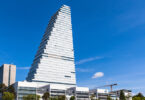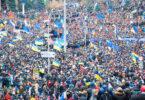
Christian Walsoe, born in 1951, studied chemical engineering at the Swiss Federal Institute of Technology in Zurich and later completed his studies with an MBA from INSEAD in Fontainebleau (F). Walsoe is the founder of the Efficiency China Forum Basel and a member of the board of the Switzerland-China Society. The Efficiency Club Basel looks back on a long history, which Christian Walsoe discusses in an interview. Christian Walsoe recently gave an interesting lecture on „Silk Road“ for the Efficiency Club Basel. In the interview with Xecutives.net Christian Walsoe points out, what is behind this gigantic and for decades laid out project, how China sees itself and how Chinese see the West. He draws attention to the differences between China and the western world, which places the individual in the centre, in contrast to China, which attaches greater importance to the overall interest of society than to the individual human being with their wishes for development. Finally, Walsoe also addresses the question of what to expect in Hong Kong.
Xecutives.net: Dear Mr. Walsoe, you recently gave a very instructive lecture on China and the new Silk Road, the Belt and Road Initiative, for the Efficiency Club Basel. You showed what incredible dimensions this silk road project has. You have focused not only on economic aspects, but also on cultural events, for example by showing how the Chinese function, what their goals and problems are, and how they see and perceive us here in Switzerland, in the western world. Before we talk about China, however, I would like to ask you what the Efficiency Club Basel is, with which you have been closely associated for many years.
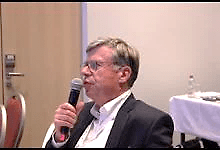
Christian Walsoe: The Efficiency Club is originally a network for trade people and (small) entrepreneurs, which emerged in the 1930s in the middle of the economic crisis. It was inspired ed by a Belgian-Canadian citizen named Herbert N.Casson in various Swiss cities who came to Switzerland and realized that entrepreneurs could learn a lot from each other, if they learned from each other. The business conditions at that time were still very different than today. There was no Internet, let alone social electronic networks, as there are hundreds of them today. Many trade associations that now operate across Switzerland did not exist at the time. Rotary, Lions, Freemasons, and Kiwanis were associations that already existed. But the Efficiency Club should work differently. With his initiative, Casson wanted to create as much quality of life and efficiency as possible for entrepreneurs with as little effort as possible. He aimed at people as individuals and at corporate success in a difficult time, thus including the private and business spheres. Even then, the topics were innovation, marketing, trend research, administrative improvements, economic and stock market developments, but also cultural topics in the areas of social responsibility, philosophy and ethics, getting to know foreign countries and cultures and socialising with like-minded people.
The club slipped into problems in 2004, among financial ones. The last president had died in office, there were too few volunteers who wanted to take part in the events and the financials were poor. In a memorable general assembly, a few members rescued the club from bankruptcy by restructuring the club’s treasury, and I agreed to take over the presidium if a renewed and rejuvenated board of directors could be found. At that time I came from big industry and I liked the idea of the Efficiency Club with its versatile topics. Such a club must not go down. For more than ten years I was able to lead the club together with my colleagues on the board to new shores, i.e. event categories. Real friendships have developed with some fellow board members and members.
The Efficiency Club Basel still exists today after more than 80 years, although the topics have naturally changed over time. China (and Asia) has been a topic in the Efficiency Club for 12 years now – members and guests receive inspiration, food for thought and important first-hand information on developments in this once again significant country and continent.
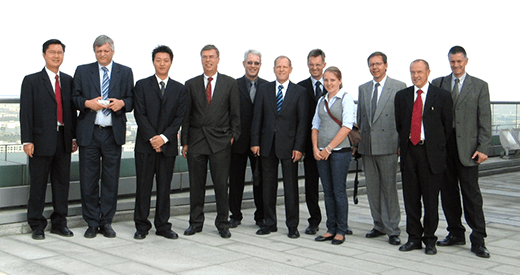
Xecutives.net: How did your interest in China came about?
Christian Walsoe: The trigger was a trip with members of the Efficiency Club Basel to China in 2006. We came back with the realization that we know far too little about the so different culture of this giant empire and its incredibly dynamic development after its opening to the outside world. People had heard of the Chinese Cultural Revolution, of the deterrent communist power apparatus, but economically and culturally most people, who were not professionally active in China, knew little about this country. We all knew something was going to happen that would change the world.
We wanted to get to the bottom of the matter and visited Shanghai, Suzhou – one of the many mushroom-growing economic zones and Guangzhou (the former Kanton), the economic centre in southern China. For us, that was an incredible broadening of our horizons at the time. The participants of the journey were of the opinion that one could not leave it at this one journey and had to pursue this topic further. A short time later, the Efficiency China Forum Basel was founded.
After our return from Guangzhou, we had suggested to the Basel government that it enter into a partnership with this southern Chinese city. To us this city seemed better suited than the huge Shanghai. But of course, when Novartis and Roche favored a city partnership with Shanghai, this new global metropolis was a priority.
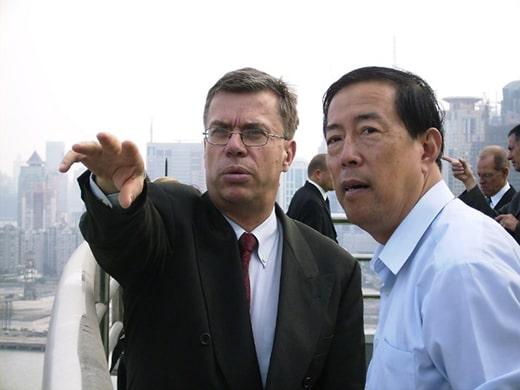
Xecutives.net: It is amazing what has happened in China in recent years. China is well on its way to becoming the world’s No. 1 economic power. The country has quickly mutated from an agricultural state to a value-added country. What do you see when you look back?
Christian Walsoe: Looking back, it is very exciting for me today to see how these processes in and around China are a process. In the many years that experts have been talking about Chinese issues, China has evolved and changed at a pace that is unimaginable here in the Western world. It was exciting to see how this familiarity with a 5000 year old culture also affected my own perspective. It is not surprising that Chinese style Sino-Marxism prevailed as a political form of government. Today Xi Jinping can certainly be compared to a Chinese emperor. He rules over this large collective society of over 1.3 billion people like an emperor.
The family network is very important in China. The people in these family networks are strongly connected, but also dependent on each other. If you stand outside this network, however, dealing with outsiders can be brutal and unscrupulous. The 1.3 billion Chinese live together in a very confined space, and everyone has to assert themselves if they want to move forward. The competition between individuals and strangers is enormous.
As Swiss – used to a western world – we are suddenly faced with a different “psychogram” than we know here in the West. Here, too, the family is important. However, we are constantly weighing up individual interests and opportunities for development. In general, we are much more individually oriented than the Chinese in everything we do. Today one recognizes that the state of China also has to make confessions about the individual development possibilities again and again, because the people there also have individual and personal needs. But China is still a collective society. And China is a country of contradictions. We must understand these. The country is strongly organized hierarchically. Despite the communist regime, the country allows for great capitalism. Take a look at Jack Ma, the Chinese entrepreneur and philanthropist, one of the richest people in the world. He is tolerated by the communist power apparatus as long as he does not disturb the political system. Neither do the other billionaires. As long as they are relatively free to act externally, they don’t care.
Xecutives.net: How do these billionaires, many of whom now live in China and many of whom also invest in Switzerland, differ from the Russian oligarchs with whom we are more familiar?
That’s a good question. They differ in that Chinese billionaires have not enriched themselves at the expense of the state in collapsing and eroding states by using political weakness to create economic advantages for themselves. The Chinese billionaires have built up their wealth with their own strength, just with good business ideas and a sense of value creation. In terms of personality, they should not differ too much from the oligarchs in Russia.
Unlike Russia, China itself has not earned its wealth on the basis of raw materials. With Xi Jinping, China has definitely understood that one has to deal with the western world and that without technology and development it will not work in China in the long run. China didn’t want to make the same mistakes as the Russians, but also not like the Chinese emperors in the 19th century, who didn’t want to know anything about Western technology and then had to let themselves be shamelessly exploited by the English. Even today, the Chinese regard this as a great disgrace. This disgrace – a neurotic event – today turns into a great self-confidence, into pride or even arrogance.
For a long time, China was only concerned with itself. It never pursued an expansionism like the European countries. However, China sees itself as the empire of the (world) centre – with important territories such as Tibet and Hong Kong, which it regards as belonging to its empire. So the centre of the Chinese world is not in the USA or Europe, but in China. There are many geographical aspects about which we here in the West do not know much, but which are important in this context. China has about five times less water available than the USA, and this with the same area with a population more than twice as high. That is why Tibet is so important as the water reservoir for China. Moreover, the water in China is poorly distributed and more than a fifth is so polluted today that it can hardly be recycled. The scarcity of water is one of the reasons why the agricultural economy in China has never been able to develop as well as in the USA. And this has contributed to the fact that there is a large gap between the city and the countryside that still exists today. Primarily the coastal regions have benefited from economic development so far, whereas the rural regions are still much poorer. This leads to social tensions, but also to targeted strategic development programs by the communist leadership in the poorer western and northern provinces.
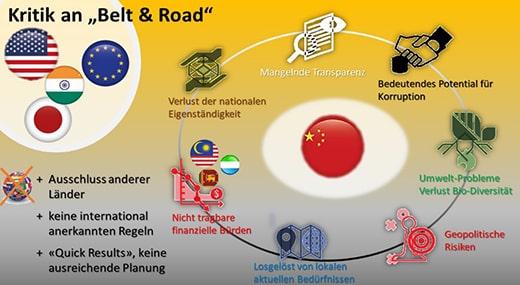
Xecutives.net: This is an interesting point and this is where Xi Jinping now starts with the Belt and Road Initiative. What are its goals with the many billion dollar investments around the world?
Christian Walsoe: His aim is to enhance the value of the provinces far from the coast, where many underprivileged people live, and to reduce the social gap by developing them. Xi Jinping wants to increase the living conditions in these provinces as well and has started to expand the Chinese trading areas into these provinces and to build up more value-added production there. He is aware that technological change on the one hand and the relocation of low-value-added industries to the surrounding Asian states on the other are endangering China’s developing middle class. But these are not „just“ a few million people who are affected, but 500-700 million. China has no interest in using military means. The machinery of power does it differently. He seeks economic partners around the world to help improve and expand trade potential with China.
China was able to develop enormously rapidly from an agricultural state to one of the three strongest economic powers in the world. That worked above all because the political system allows very quick decisions. The communist party has a lot of power and it makes plans in the sense of Chinese society. While we are here discussing the train station in Stuttgart, planning for years to come and taking political hurdles for every major project, the Chinese are unceremoniously building a whole dozen stations and high-speed lines. They simply implement their projects at a speed that is unimaginable for us, but also makes us think. And they have now continued this speed with the Belt & Road projects abroad, negotiated with their governments, but without sufficient involvement of the local population.
Here in Europe, we are looking at the individual people who are doing badly in this way in China. We read reports about people in whole districts who are sent away or whose livelihoods are destroyed in order to build whole new districts and establish industries for a much larger number of people. We have a hard time here with the idea that the Chinese give more importance to the common good than to the fate of individuals or minorities. This completely different view is anchored in the Chinese constitution. The Chinese government also has difficulty with our UN Human Rights Charter because it focuses on the individual and his or her protection, whereas the Chinese leadership primarily thinks for society and does not focus on the development opportunities of the individual. Here in Europe we see the Uighurs as an example of a people oppressed by the Chinese power apparatus and we are horrified by their re-education in prisoner camps. I myself hear contradictions about this in China. Many Han Chinese say in conversations that tehy don’t want terrorism and that would only be possible by separating rebellious people from society and re-educating them. Terrorism must be prevented at its roots. As long as minorities adhere to it, they are tolerated or their particularities are also supported and preserved; but if they rebel against the general public, they are fought against. This shows this completely different perception from what we have in Europe.

Chinese life together in very limited space. The privacy in China is much smaller than here. In addition, there is enormous competition, which can lead to ruthlessness. This explains why the Chinese have much less problem with individual surveillance than we do here in Europe. They are of the opinion that if traffic is monitored by the state with cameras, fewer accidents occur and less brutality and crime is possible. This explains why facial controls in China are used with great ease as legitimate means. Chinese consumers are happy when the state looks at companies, evaluates their good or inadequate behaviour and makes it public. Then they’ll know where they’re at. In China it is not like in our country, where in the course of the last hundred years a lot of standards concerning quality, safety and hygiene have been developed, which we as citizens can trust. This did not happen in China. But the Chinese consumer also wants quality, safety and hygiene and many are glad that sinners are pilloried or punished by the state.
Xecutives.net: I am surprised when I read newspapers here in Europe that we are always concerned with the question of who the Chinese are and how they work. In your presentation on the Silk Road, you yourself raised a completely different question, which in my opinion is more important, namely how the Chinese, for example, see and perceive us here in Switzerland. This view is hardly described. How do the Chinese see us here in Europe?
Christian Walsoe: That’s very interesting and it’s important to me to show the audience what the Chinese think of us and how they perceive us. It makes a big difference whether you meet Chinese people here in Switzerland or in your own country. I would like to illustrate this with an example: A few years ago, during the ART Basel, we led a group of well-known Chinese people through Basel. The visitors were very fascinated and interested. They asked a lot of questions. They were surprised that we are preserving old houses and how we protect our cultural heritage. We talked about sustainability, which is expressed e.g. in a cityscape. This sustainability is admired, but aren’t they also signs of stagnation?
After his visit, the head of delegation and member of the executive branch of one of China’s most dynamic cities invited me to a return visit and asked me to work out a concept for him. The question was how sustainable urban development could also be pursued in China. I met with specialists in Switzerland and travelled to China with a concept. There I had the opportunity to speak on local television. In China itself, however, it quickly became clear that my host was the main character in this TV project. His goal was to show that he was important. Then something very impressive happened to me. Although he was an executive member of the city government, it became clear that his influence was limited to important developments. I had suggested to him to found a university institute for sustainable urban development, in which one deals with the development of Chinese cities, in the hope to be able to influence the communist planning regime through the institute. But that didn’t happen – as an executive member of a city government he couldn’t write this on his own flag and implement it, the planning committee of the communist party has the final decision. Important decisions all come from the communist planning office. There, if you like, the big throws are defined, which then have to be implemented by all the others, as the planners in the planning office dictate. There is hardly any room for discussion. My host worked for the city and at best had influence on the details of the execution.
Then the WEF in Davos came to my mind on the spot. Such an occasion arose because Klaus Schwab himself brought his whole life and energy into the project and then gathered others around him who recognized the importance of such a platform together with him. Such an initiative, initiated by a single person, would not be possible in China.

Xecutives.net: In the aftermath of your presentation and before this interview, I thought about my school career and spoke with teachers and pupils from different schools. My question was always whether China was a topic in school, whether one had read a book from China or had learned something about the economy there. The answers didn’t really surprise me. None of the persons addressed could confirm this. Considering that most of the things these people wear, including shoes, technical equipment and game equipment that young people have at home, come from China, that’s a little surprising. How do you see that as a Swiss with four children after your visits to China?
Christian Walsoe: (Laughs) Yes, look, that was also the reason why we from the Efficiency Club wanted to get involved in China and have now organized dozens of events. The view of the world is important and what happens in China also has an impact on Europe and thus also on Switzerland. I too am surprised that people in Switzerland prefer to stick to the negative prejudices against China, but do not really want to deal with their view and their reasons for an improved standard of living for an entire billion people.
By the way, I’ve already asked your questions at schools. There, China is normally not an issue. But China’s role is becoming increasingly important. The U.S. under Trump understands it. China is travelling at a speed that is unsettling even the USA. Think of 5G or the electric car industry. The USA is about to lose leadership here, which is reflected in nervous maneuvers by the USA government accusing Huawei of espionage. For years, the US has done nothing to get its own industry up and running, but has willingly relocated production to China and other Asian countries. At the same time, they wanted to participate in the huge Chinese market potential. The Chinese, on the other hand, are smart and act strategically in the long term: only if you let us participate in your technology we will open our markets for you.

Xecutives.net: Mr. Walsoe, what’s going on with the new Silk Road? What goals are the Chinese pursuing with this gigantic 100-year project, probably the largest infrastructure project that ever existed in the world?
Christian Walsoe: The goal of the „Silk Road“ or „Belt & Road“ project is much more comprehensive than what we read and notice here in the West. Of course, the foundations are laid in the construction of the land-based infrastructure from Central Asia to Europe and Africa and the maritime silk route (the „Road“), each with a gigantic project volume. In Sri Lanka, for example, the Chinese are currently building a new city that will provide living and working space for 300,000 people. In Pakistan, the Chinese are building five coal-fired power plants and two nuclear power plants, an oil pipeline and a mountain road to Xinjiang and a port in southern Pakistan, which will make China’s supply and trade less dependent on the Strait of Malacca. Pakistan’s developed agriculture is to supply the plant raw materials that China’s Xinjiang province needs to become the leading textile zone for Asia’s high-end textile fashion. All these projects are gigantic and have so far been carried out at a pace that does not conform to Western procurement standards and ecological requirements. In addition, some countries having undertaken these projects will become financially highly dependent on China. There was a lot of criticism from the West. President Xi Jinping promised improvement and an opening for the participation of foreign project partners. How far can we from Europe take him at his word?
China is dependent on global trade. Every country needs the infrastructure for fast and modern trade flows. To create new trade opportunities, China needs partners and a functioning infrastructure. China intermeshes economically with countries in Asia, Africa and around the world, thus securing its value creation potential. China wants to become market leader of new value chains because it has been shown that market leaders can better determine the conditions of value chains than if they only remain suppliers. One example of this is electromobility. China does not want to underpin its claim to power militarily, but commercially and technologically. The country wants to expand global trade and thus create prosperity for its own SMEs and for those of its partner countries. For me it is not only political rhetoric when the Chinese leadership speaks of the emergence of a „community of destiny“. They want to produce in China (and in friendly foreign countries) and preserve millions of jobs or create new ones. The „Silk Road“ project is an expression of China’s politically blessed, transnational industrial policy. For me, „Belt & Road“ is like the branding or marketing label of China’s multinational industrial policy.

Xecutives.net: Of course, China also wants to secure resources for itself in the long term. This is the reason why enormous piles of money are raised. So far, this does not differ too much from what many European countries did during the colonial period. How do you see this Chinese colonization?
Christian Walsoe: This is also an interesting insight, but it happens in a different way. The Chinese have significantly improved the infrastructure in the countries in which they operate, thus creating an essential prerequisite for the prosperity of the population. The Chinese are going beyond. They enable these countries to build and operate their own factories. These countries are to become suppliers to China. China tries to secure the production steps with higher added value for themselves and promotes those steps with lower added value in the partner countries. That is not what we have done here in Europe in the colonized countries. We went to other countries and simply exploited the peoples there. People were seen there as a raw material, a reason to abuse them as slaves. And then we brought their raw materials to us at the lowest possible cost. The Chinese do it differently. They are ready to set up the infrastructure, not free of charge, but with long-term supply contracts. And they promote the development of initial value-added steps in these countries. Until a few years ago, there were no significant horizontal transport links within Africa. The Chinese are currently expanding such a transport infrastructure from Angola across Africa. And in Ethiopia and Somalia, textile companies and other low-value-added productions are being set up with Chinese help and training.
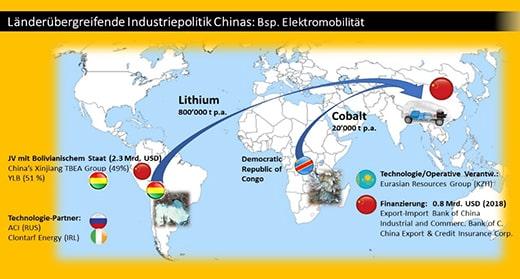
Xecutives.net: We need, for example, for a simple road rehabilitation in Europe, including Switzerland, a multiple of the time, and probably also the money, that the Chinese need for the same work. The first jokes that people like to tell each other are already circulating. What is behind these jokes and what do we have to learn?
Christian Walsoe: The Chinese do this in other countries – not without problems – just as they do in their own country. Big plans are forged and implemented. China has achieved this in 40 years, for which we in the West needed 400 years in terms of the economy. The Chinese admire us on the one hand. They find our cities beautiful and enjoy the mountains and lakes. But you also notice that here in Switzerland and in the western world everything is progressing very slowly. You are right with your example, which can be understood as a metaphor for many things. In fact, many public-sector construction sites take far too long, which makes them more expensive. Some companies would have to file for bankruptcy if they worked like this. But this is also the result of our political system. It is often complicated to be able to implement projects because many particular interests have to be weighed up. Here the Chinese have a completely different view, as we have already heard. They are not based on individual needs, but on the needs of society. For the Chinese it is difficult to understand that there are so many ways of appealing for this and that in Switzerland and that politicians pursue particular interests. They consider our democratic system to be sluggish and ineffective.
Xecutives.net: But the Chinese also have a completely different way of negotiating contracts, for example. Criticism is levelled at the fact that it is often difficult to reach binding agreements. And once something has been agreed, it can easily turn out quite differently. What’s behind all this?
Christian Walsoe: It takes a lot of time to establish a relationship of trust with the Chinese. They want to know who we are. You do that when you eat, for example. In Switzerland and Germany, we tend to conclude contracts quickly and efficiently. You come in, you make a contract, and then you leave. The Chinese do it differently. For a Chinese, a contract doesn’t have to be made today or tomorrow. They ask questions, also about the family, about the training of business partners. You want to be able to trust your business partner. Relationships are important, not individual characteristics. Because so many things change so quickly, contracts are only important at the moment, but not necessarily in a year. It is more important to recognize what position of power my counterpart has and whether I can rely on him and move at eye level with him. For the Chinese, there are not black and white, but constantly changing shades of grey; there is not THE truth, there are always different truths that result from the practical situation.
Xecutives.net: In conversations with experts who have something to do with China or have lived there for a long time, I repeatedly notice that a Swiss might get the feeling that the whole of Switzerland is a kind of museum, an open-air museum, like the Ballenberg. Maybe that’s what we look like to the Chinese who visit us. Our lack of interest, also on the part of our school system, which does not have China on its curriculum, could blind us Swiss people to developments in and around China. To put it somewhat exaggeratedly: Does Switzerland risk becoming a museum in the long term?
Christian Walsoe: (laughs) Switzerland certainly has a great chance of remaining more than just a „museum“. However, Switzerland is surrounded by the EU and heavily dependent on it. I see the Ballenberg problem rather there. The EU currently has to overcome difficult hurdles and there are many internal struggles. Nationalist ideas pop up at every end, weakening the EU as a whole, of course to the delight of other powers in the world such as Russia, China and the USA. They recognize our procrastination and that suits them very well. The EU is perceived as divided and weak, which the Chinese are exploiting.
We will not become a museum in Switzerland. But we can’t just rest and think, the (Asian) tourists will continue to come to us and the trade will run by itself. What we have to learn is not only to think in black and white, i.e. either/or, but to live with contradictions. We have to deal with the Chinese and understand why they are the way they are. Economic developments are also affecting Switzerland. Think of electric mobility and autonomous driving. The Chinese want to take the lead here and Europe must make an effort to keep up. Switzerland will have to actively maintain its strong position in value-creating niches. We have achieved a high standard of quality and living due to our small size, our stable political framework, our innovative strength but also our high ethical standards and reliability. But China’s increased self-confidence and the shift of economic dynamism to Asia will challenge Europe and Switzerland.
Xecutives.net: Where does an average Swiss person see the effects of the Belt & Road Initiative on Switzerland?
Christian Walsoe: China’s strategic interests affect us directly. China recently made its largest direct investment abroad with the purchase of Syngenta in Basel. China wants to improve its agriculture and bring Syngenta technology to China. Many people and politicians are shocked by this transaction. The new owners will challenge Syngenta and its many employees in Basel and the surrounding area, but it is unlikely that the company will be dismantled as it would have been if it had been taken over by Monsanto or other Western companies.
Back to the „Silk Route“ and its direct impact on Switzerland: What is China doing in Italy? Italy is prepared to engage in cooperation with China because the country does not feel it is being treated properly by the EU. The same is happening in Eastern Europe with the new railway line between Budapest and Belgrade. The EU is turning up its nose.
The ports of Trieste and Genoa could become new entry points for the Chinese into Europe. For Switzerland, this could mean that the transport of goods from the South could become much more significant again. This could have consequences for northern ports such as Hamburg or Rotterdam.
Xecutives.net: We have now talked a lot about the economy and looked at the view of China and the Chinese view of us. But what about the problems China has with minorities, human rights, currently also the challenges with Hong Kong, which shows with the communist party system in China with demonstrations that they disagree. In short, do you yourself see the risk that China could fall apart sooner or later, as happened in Russia, for example, not so long ago? A China expert recently said in a private conversation that many dissatisfied migrant workers were working in China. If these would rise, it could even cause the system to tip over. The expert does not rule out such a scenario.
Christian Walsoe: I do see this danger. I would be surprised if the Communist Party were to accept such actions in Hong Kong for too long. A large part of China’s population wants reliability and stability. If there are bigger protests and they continue and at best jump over to China itself, then I don’t rule out that China will use the army. We have already experienced this before with Tiananmen in China, where tanks were mounted. That was 30 years ago. As soon as China recognizes signs of insubordination, the regime takes action; we have already talked about the situation in Xinjiang. A majority of Chinese society could welcome or at least tolerate such a crackdown in other parts of China.

Xecutives.net: At the end of your lecture about „Belt & Road“ you pointed out that a new world order is in the making. What do you mean?
Christian Walsoe: That’s not primarily me, but rather the persons who have been a connoisseur of China and Asia for many years, such as the former European Minister of Portugal, Bruno Maçães, who now heads a think tank in Beijing, or the Indian Parag Khanna, who analyses Asia from Singapore as the world’s new dynamic center. The democratic order of values is no longer seen by many Asian states and their populations as the absolutely desirable form of state and life. Which characteristics a new world order will have and whether it will be a single one is certainly still open. China is likely to aim for a multipolar world order in the long term. The graph attached here with the possible four scenarios developed by Bruno Maçães is intended to illustrate this.
Xecutives.net: Dear Mr. Walsoe, I thank you for the time you have taken for this interview and wish you continued success in your China studies and your relations with culture and people in the vast Middle Kingdom!
(C) 2019 by Christian Dueblin. All rights reserved. Other publications are only permitted with the express permission of the author.
- website: Efficiency Club Switzerland
- Flyer Efficiency Club lecture: «Belt & Road» – Start einer neuen Weltordnung?




